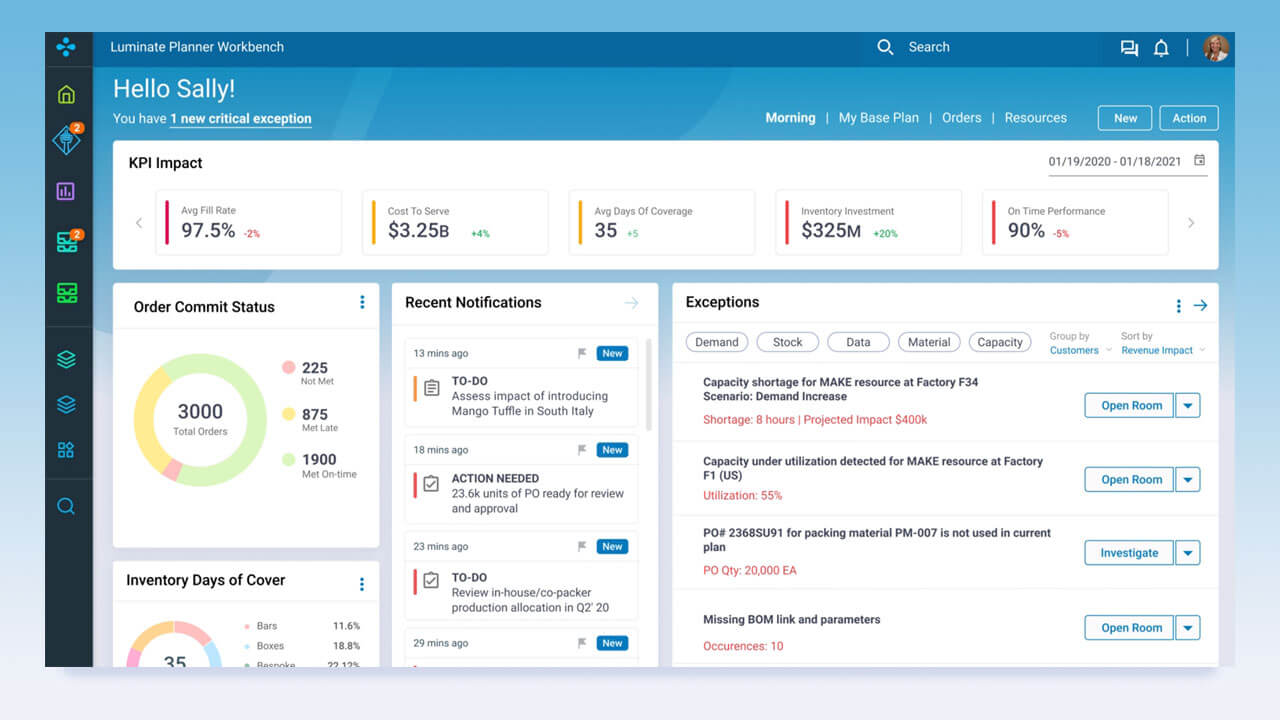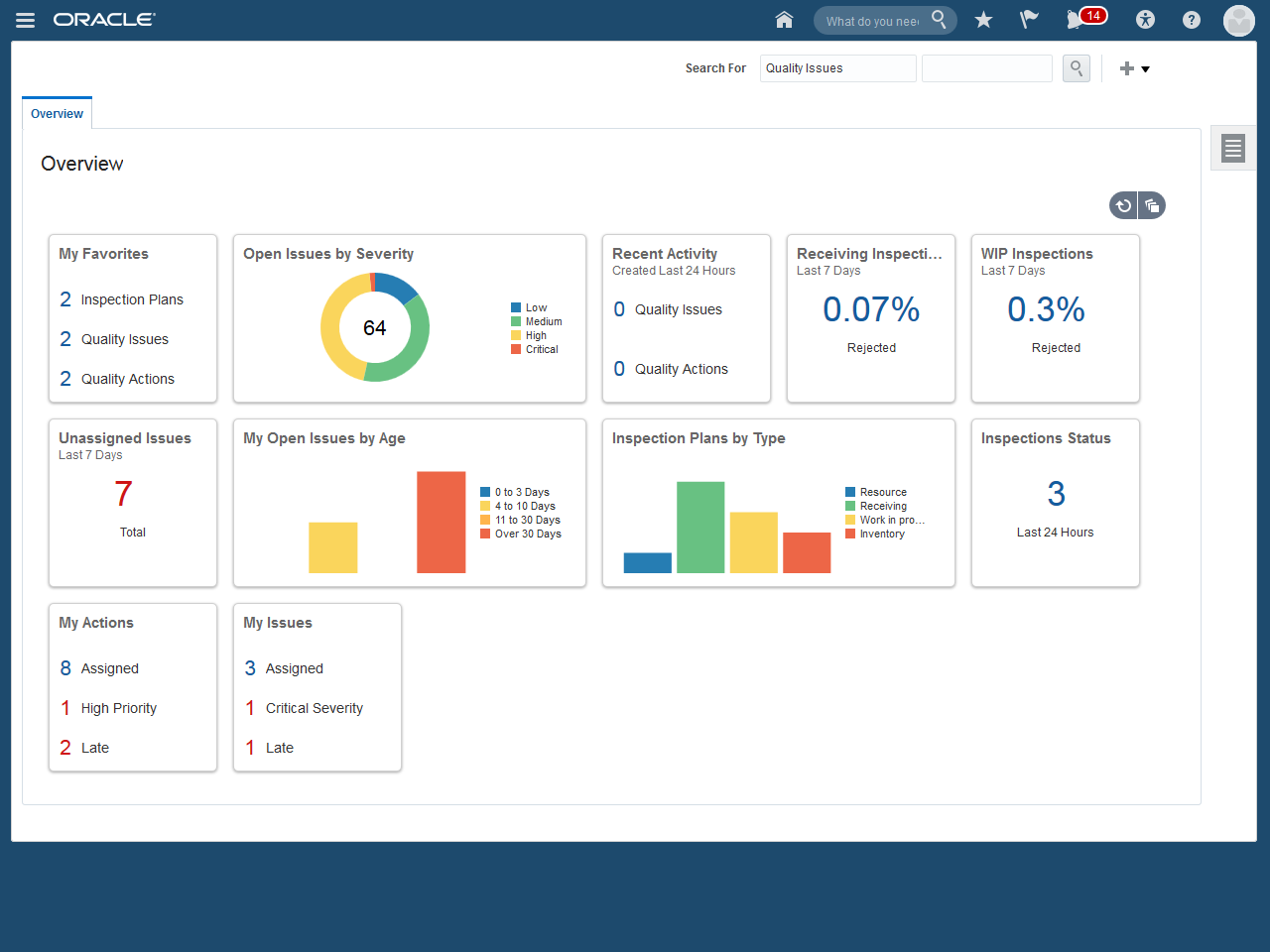Best Supply Chain Management Software for 2021
A supply chain management (SCM) system is a vital key for businesses to maintain a healthy relationship with suppliers, boost company growth, and ensure an efficient flow of stock. SCM is a complex concept, integrating a wide array of processes and many critical functions, but it can be easily managed through some of the most competitive and innovative management software. The best SCM software grants continuous reliability on the delivery of products and services.
SCM tools bring automation to forecasting, sourcing, and inventory management. They provide real-time feedback on the status of a service lifecycle, or monitor the availability and delivery of a product from the warehouse to the hands of the consumer.
Read more: What Is the Supply Chain Management Process?
Best Supply Management Chain Software
Here is a list of seven supply chain management software and what they offer for businesses in all industries.
Blue Yonder
Formerly known as JDA SCM, Blue Yonder is a cloud-based supply chain management solution for large enterprises mainly in the food and beverage, consumer goods, retail, automotive, and aerospace sectors. It offers a variety of tools to integrate real-time market indicators about shopper behaviors, and generate planograms and assortments for deep insight into the status of product life cycles.
The platform includes built-in features for order fulfillment and replenishment, Qstock monitoring, and inventory planning. Standalone applications include workforce management, demand planning, TMS, VMI, supplier management, order fulfillment, supply chain management, inventory management, and procurement and sourcing.
Blue Yonder enables resourceful supply chain management This enables you to supplement, consume, mine, enhance, and assess rich datasets to identify new insights throughout an established supply chain network for informed and actionable ML/AI-based decisions. Lastly, Blue Yonder enables you to link your enterprise and SaaS-based programs, comprehensively aligning your delivery, planning, and execution capabilities from font to end.


Product Features
Oracle SCM
Oracle SCM, also being a cloud-based solution, offers a full suite of applications for companies to manage their supply chain, manufacturing, inventory management, fleet, and distribution. Oracle SCM has an extensive collection of applications that are secure, innovative, flexible, and fast to address the demands of the market environment.
As a multi-app platform, it provides a manufacturing cloud that streamlines the production process through visualization, social collaboration, and back-flushed transactions. Oracle SCM also offers the Oracle Planning Central Cloud, which is a user-friendly chain planning solution that balances supply and demand and monitors the user supply.
Oracle SCM is an integrated open-source, and comprehensive suite of supply chain management that incorporates top functionalities with interchangeable application and buying options.


Product Features
ShipBob
ShipBob is a shipping platform and a third-party logistics (3PL) provider combined. With fulfillment centers in Canada, the United States, and the United Kingdom, they can provide one- or two-day shipping management for your target market.
It is one of the few SCM solutions that provides partner integrations to sync the status of the whole supply chain process — including inventory management, warehouse management, order management, and transportations management. Given the fact that it is a 3PL, ShipBob handles the logistics of your e-commerce products, while the solution allows you to manage the lifecycle of your product from end to end.
Businesses with a client base predominantly in North America will benefit from overnight or two-day delivery supported Descartes is a supply management solution that provides a wide range of modular cloud-based logistics and interoperable web solutions. It enables your business to deliver value for logistics processes operating across the ocean, air, or ground.
One of its strongest features is the management of a global network of transportations securing mobile, telematics and routing, regulatory compliance, customs, and broker enterprise systems. This is excellent for creating delivery appointments that serve customers while reducing expenses.
Regulatory modules enable the continuity of cross-border shipments, gather data, and consolidate it to ease filings and reduce the risk of fines. When a business needs to comply with the mandates for security, commercial transactions, and safety, Descartes offers secure storage for all these records in the cloud.
With Descartes Global Logistics Network, companies have access to over 150,000 connected parties in more than 140 countries. This extensive network provides faster access to regulatory, commercial, and logistics documents, as well as the agencies that issue them, ensuring smooth and fast delivery.


Product Features
EnterpriseIQ
EnterpriseIQ EnterpriseIQ integrates manufacturing and accounting with an extensive suite of applications for production planning, EDI, BI, and CRMs — eliminating the need for third-party API integrations. EnterpriseIQ natively integrates front and back-office performance with real-time production monitoring, scheduling, reporting, accounting, and inventory control.
EnterpriseIQ’s manufacturing module provides a complete plant floor planning system, handing over all the tools necessary to manage production across one or multiple plants. You may also add advanced manufacturing solutions for SCM, Scheduling Planning, and Project Management, as well the Execution Manufactory System as your organization scales.
Another feature of EnterpriseIQ is its multiple manufacturing design environments, so it can reference functionality needs Microsoft’s Dynamics 365 Business Central is a consolidated business management solution designed for small to midsize businesses. This adaptable solution comes with easy monitoring for budgets and reports that can be generated in co-relation to managing inventory and cash flow. It gives a complete picture of your company’s sales, purchasing, accounting, inventory, and customer service reports.
Business Central was built on the source code of Microsoft Dynamics NAV, which has been adapted to for cloud syncing. For companies that want real-time information anywhere and anytime, Dynamics 365 is a good solution to handle supply planning and availability, finances, sales, inventory, delivery, projects, and warehouse management.
On the other side, Dynamics 365 is a young software with few understandable hiccups. While the warehouse and management features are useful, some users found the software too complex to set up and use as first-time SCM users.
Product Features
Acumatica Cloud ERP
Acumatica is a scalable cloud ERP solution that is designed to unify your organization’s information. By supporting collaboration tools, Acumatica can centralize your business data storage. This Cloud ERP is suitable for startups and midsize businesses, but it is also well known for its performance in other areas, such as manufacturing, distribution, retail, and e-commerce.
Acumatica ERP enables you to collect critical information from a variety of sources and present coherent reports designed for fast decision-making. Its built-in CRM functionality centralizes all customer records, making them accessible at any time from a single database.
Also, a great feature of this SCM is that the platform gives you an in-depth overview of the health of company finances, as well as tools such as Acumatica General Ledger. Tax management and bank feeds will help with workflow automation, historical data migration, and management of multiple financial entities.
Product Features
What Is Supply Chain Management?
A supply chain is a network of companies, individuals, technologies, resources, and activities used to make, sell, and distribute a service or product. Supply chain management is having complete control of the five components of the production of services or goods: planning, sourcing, manufacturing, logistics, and returns. By applying a centralized management process that can be replicated, organizations cut excess production cost and delivery time.
In short, you can say that SCM is the active management of activities that will be performed to transform raw materials into end-user products, maximizing customer value and establishing a competitive advantage in a sustainable manner.
Key Features of SCM Software
Choosing supply chain management software is no straightforward task. Here are some of the key features you will want to keep in mind when searching for a solution for your business.
Inventory Management
A business using supply management software can dramatically improve how they manage and track raw materials and other components needed for manufacturing, finished goods, spare parts, and stocked products. Inventory management can assist with managing your assets, integrating barcodes to your products, and forecasting prices.
Order Management
Accelerating the execution time between when an order is placed to the moment of delivery can be done Another key feature of supply chain software is the ability to anticipate customer demand based on forecasted information from plans, procurement, and product processes. Planning and forecasting tools help eliminate unnecessary purchases of raw materials and excesses of finished goods.
Read more: What Is Predictive Analytics?
Product Manufacturing
Simply put, supply chain management software helps companies manufacture their products better. Monitoring customer demands and comparing them with warehouse inventory, the software can create purchase orders and manufacturing orders to comply with demand. This all happens from a central location, ultimately achieving an entire process of production and delivery that is more customer-oriented.
Logistics
Complete coordination is required to reduce overall operating expenses and remove any weak links in the supply chain. Logistics tools help with tracking customer orders, scheduling delivery of products, dispatching inventory, invoicing customers, and receiving payments. Warehouse management can be integrated to help with storage optimization, labor management, labeling, and more.
Returns
Inspecting and handling defective or broken goods — either from the company’s warehouse or from customers — can be automated. Processing claims with distributors or suppliers and establishing a network of go-to processes can simplify tasks such as handling excess inventory, taking back unwanted or defective products, and processing refunds.
Why Is Supply Chain Management Important?
The standard has become a right-on-time supply chain, where retail sales automatically signal ongoing replenishment orders to manufacturers. the best supply chain management software helps to minimize cost and time wasted in the production cycle. Business shelves can now be restocked on a per-need basis, almost as quickly as an order is placed Deciding to integrate a supply chain system that fulfills the needs of your organization could be the difference between a long-term and successful business, and an organization overshadowed Read next: Solving Supply Chain Management Problems
